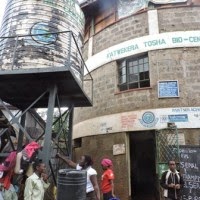Importance of Investing in Menstrual Hygiene
Written by Jenny Jecrois- Roughly 500 million girls and women globally face limited access to managing their menstruation, according to the FSG report. The Menstrual Health in Kenya Analysis reports that 65% of women are unable to afford sanitary pads, 50% of girls openly discuss menstruation at home, 32% of rural schools have facilities available for menstrual needs, and only 12% of girls feel comfortable receiving menstrual information from their mothers. There is a significant barrier to menstrual hygiene management (MHM) across Kenya, and it considerably harms girls and women living in low-income areas.
Fortunately, the importance of menstrual health is no longer unnoticed by global health organizations as they acknowledge that menstrual health is a matter of human rights. The report, Making the Case for Investing in Menstrual Health and Hygiene, is part of the growing effort in advancing menstrual health and hygiene (MHH) needs. In this report, it is stated that despite the increase in partners and attention to the issues of MHH, institutional funding is nowhere near what is required to address the challenges of MHH. Many organizations focus their investment on menstrual hygiene products, education, and water hygiene and sanitation (WASH), while few addresses social norms and policy. All sectors must be invested in this because MHH is greater than a lack of menstrual health products but also involves debunking societal and cultural norms.
As mentioned, addressing MHH requires a multidisciplinary approach in which public health; water hygiene and sanitation, environment, gender equality, and education are all considered. The importance of investing in menstrual hygiene is for the improvement of women’s' and girls' health and quality of life. Investing in MHH has a positive correlation to economic development as MHM can keep women at work. Proper menstrual hygiene keeps girls in school, therefore allowing them to maintain the same educational pace as their male counterparts. Improved communication and sensitization around MHM can also ensure better mental health amongst women and girls by empowering them rather than making them feel estranged.
Investing in menstrual hygiene aligns with achieving several Sustainable Development Goals, specifically good health and wellbeing, gender equality, and clean water and sanitation. Such an investment is no more than investing in human rights because women’s rights are human rights. A world without period poverty is possible if we focus our attention on investing in menstrual health and hygiene.



I was devastated when I lost access to my crypto wallet containing $297,900 in USDT and Bitcoin. The panic and helplessness were overwhelming until I was referred to Morphohack Cyber Service. Their team of digital forensics and cyber recovery experts quickly stepped in, and to my amazement, they successfully traced and recovered every cent in my wallet.
ReplyDeleteThe entire recovery process took just 72 hours from the moment I first contacted them. Their professionalism, efficiency, and expertise were truly remarkable. I’m incredibly grateful for their help and want to highly recommend Morphohack to anyone facing similar issues with lost or compromised crypto wallets.
They’ve earned a reputation for being credible and reliable, and a quick search will show you that they’ve helped countless others in situations like mine. If you ever find yourself locked out of your crypto wallet or become a victim of crypto loss, don’t hesitate to reach out to them at [Morphohack@cyberservices. com].
Thank you, Morphohack, for your exceptional service!